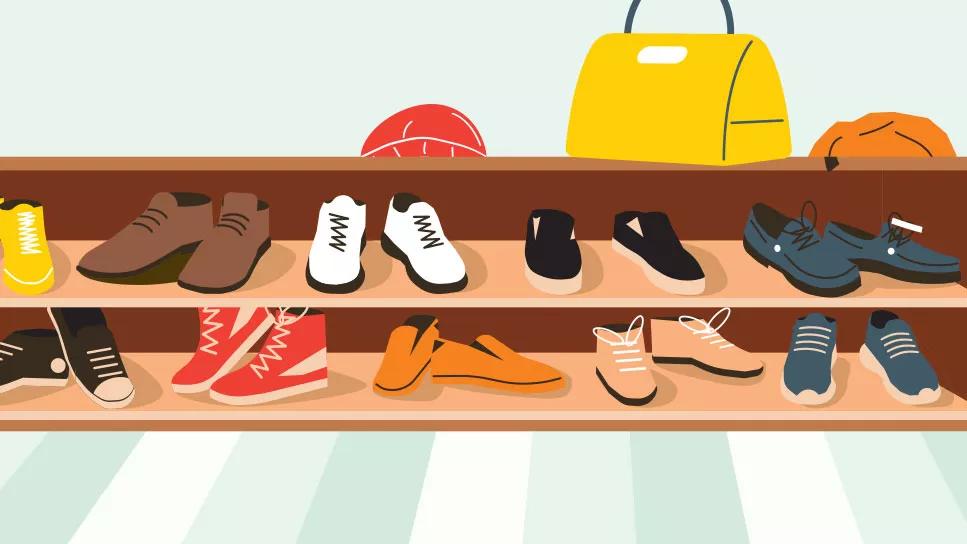Leaving footwear on invites germs, bacteria, toxins and other unwanted guests into your home

Image content: This image is available to view online.
View image online (https://assets.clevelandclinic.org/transform/e87997fa-6470-4baf-bb72-e252a446e367/shoe-Storage-Home-1388929825-967x544-1_jpg)
Shoe storage shelf home, including purses and bike helmets
When it comes to shoes in the house, are you a “Definitely take them off” or “It doesn’t matter” kind of person? Some people think shoes are gross and should never be worn indoors, while others don’t see any harm in keeping shoes on that aren’t visibly soiled.
Advertisement
Cleveland Clinic is a non-profit academic medical center. Advertising on our site helps support our mission. We do not endorse non-Cleveland Clinic products or services. Policy
But though your shoes might look perfectly clean, looks can be deceiving. Here’s what you should know about the health hazards of footwear.
Most shoes carry potentially harmful germs and toxins, so they’re best left at the door (or outside). So, what’s the best way to tread through your (or someone else’s) home?
Internal medicine physician Daniel Sullivan, MD, shares the news and “ewwws” about your shoes — and why it’s best to kick them off at the door.
“Studies have shown that most shoes have millions of bacteria on them,” Dr. Sullivan says. “The germs you track into your house can live on your floor for days or longer. Then, if you touch the floor and touch your face, the germs can get inside your body.”
More gross news: Doing a quick sole check isn’t enough to avoid these tiny invaders. Even if you don’t knowingly step in something icky, germs are everywhere. Any public place, from a grocery store to a shopping mall or public restroom (yuck), is home to a colony of microbes ready to stick to your sandals, sneakers, heels and boots. And some of them can bring illnesses.
When scientists have examined the soles of shoes, they’ve found hundreds of different germs, including:
Advertisement
“Many people are careful about hand washing when they come home,” notes Dr. Sullivan. “But remember that the soles of your shoes are touching all kinds of germy surfaces, too, so wearing your shoes inside is a lot like not washing your hands when you come home.”
Lead is a heavy metal that can affect your brain, nerves and other vital organs. Babies and children are especially vulnerable to brain damage from lead poisoning, and no amount of lead is safe.
“The most common place we find lead is in older houses and buildings with lead-based paint,” says Dr. Sullivan. “Over time, that paint chips off and lands on the ground, where it turns to dust. You can walk through this dust without knowing it and bring it into your house on your shoes. The dust can easily make its way into a child’s mouth if they’re playing on the floor.”
Many people with seasonal allergies close their windows and run an air purifier to help manage their symptoms. But if you’re trekking around the house with your shoes on, you’re working against these efforts.
“Tree, grass and weed pollen easily get on shoes,” Dr. Sullivan says, “and when you walk around your house, the pollen can fly into the air, land on surfaces and aggravate your allergies.”
Do you (or your neighbor) have a yard that’s beautifully thick and green? Chances are high that fertilizers, insecticides and pesticides are the reason for that lush lawn. There’s no way to know which chemicals you’ve stepped in, and they may affect your health.
“Lawn chemicals can have health risks ranging from eye and throat irritation to increased cancer risk,” Dr. Sullivan says. “Even if you don’t use these chemicals on your own lawn, they’re on other people’s lawns and public green spaces, and your shoes are probably collecting them. You could also be picking up asphalt chemicals from walking on roads.”
It can be awkward to ask houseguests to remove their shoes. Some people aren’t comfortable showing their socks or bare feet. Or if you’re hosting a more formal gathering, guests might prefer to keep their shoes on as part of their outfit.
“In many cultures, it’s expected that people take off their shoes at the door,” notes Dr. Sullivan. “It’s less common in the U.S., so people often feel uncomfortable asking. But don’t be afraid to institute a no-shoes policy. Your family’s health is worth the effort.”
There are also a few ways that you can make things easier on your houseguests:
Advertisement
Finally, if someone does walk through your house with shoes on, clean up afterward:
Some people need to wear shoes for arch support or to help with balance and traction. If that’s you, invest in a pair of indoor-only shoes.
“Keep your indoor shoes 100% indoors,” states Dr. Sullivan. “Don’t wear them outside at all — not even to run to the mailbox.”
“You spend a lot of time in your home, and you deserve to have a space that’s safe, healthy and clean,” affirms Dr. Sullivan. “Taking your shoes off before you come inside is a simple thing you can do to keep it that way.”
Advertisement

Sign up for our Health Essentials emails for expert guidance on nutrition, fitness, sleep, skin care and more.
Learn more about our editorial process.
Advertisement
Look for good cushioning, sturdy arch support and quality material
If they don’t fit well in the store, they won’t fit any better at home
One thing is for sure: This footwear definitely kicks up controversy
The years can literally reshape your feet
Dulling feeling in your feet could cause problems
The lack of arch support in the popular footwear can lead to numerous aches and pains
Tips for finding your perfect running shoe
Choose fit and function over fashion
Prioritize your health by managing stress, strengthening your social connections and getting quality sleep
Bolsters, blankets, pillows and blocks can offer extra support, stability and comfort
Allergies, postnasal drip, asthma or reflux could be to blame for a cough that won’t quit